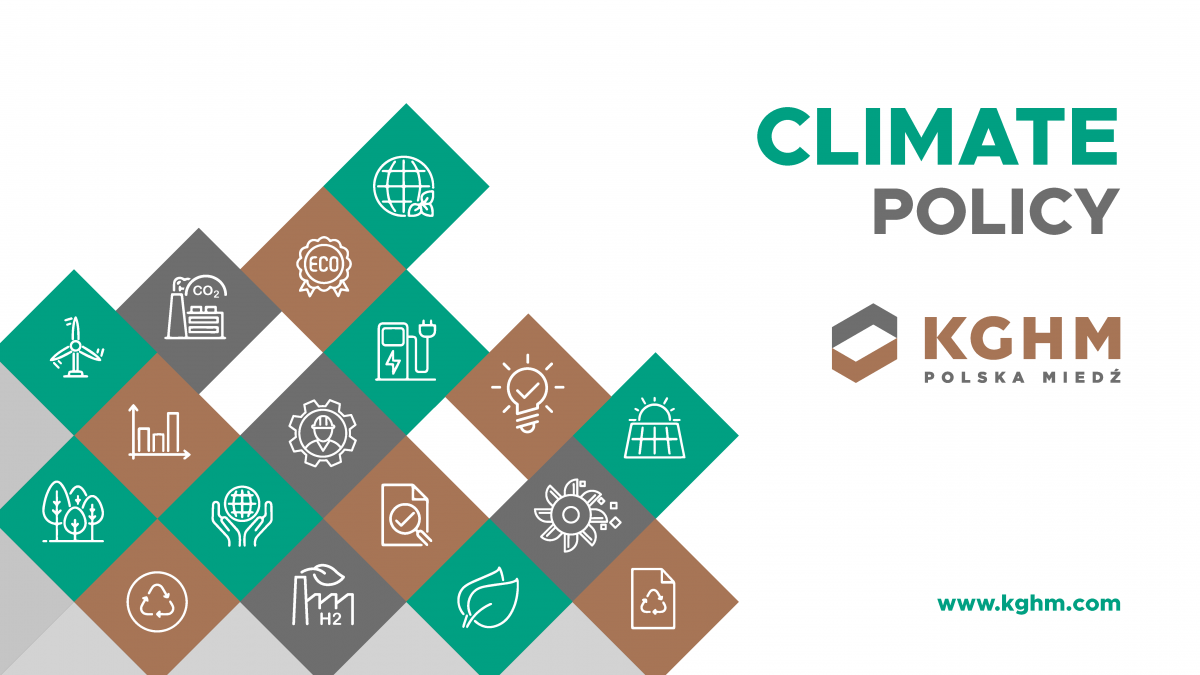On 16 November 2021, the Resolution of the Management Board on the acceptance for application of the Climate Policy of KGHM Polska Miedź S.A. was adopted - a document defining the Company's ambitious goals with respect to greenhouse gas emission reductions over the 2030 and 2050 time horizons, as well as the scope and degree of changes necessary to achieve these goals.

Main assumptions of the Climate Policy of KGHM Polska Miedź S.A.
- The primary goal of KGHM's Climate Policy is for the Company – as the Parent Entity of the KGHM Group – to achieve climate neutrality by 2050 with respect to Scope 1 greenhouse gas emissions – direct emissions related primarily to the Company's production activities, and Scope 2 – indirect emissions related to the use of electricity and heat purchased on the market, with the maximum possible reduction.
- The intermediate target is to reduce combined Scope 1 and Scope 2 emissions by 30% by 2030 compared to emissions in 2020. The reduction targets covering the entire KGHM Group will be made available to the public no later than by the end of 2024.
- Climate Policy of KGHM Polska Miedź S.A. - document - 2nd Edition [PDF]
- Climate Policy of KGHM Polska Miedź S.A. - leaflet - 2nd Edition [PDF]
Decarbonisation Programme of the KGHM Group
- The consequence and method for achieving the goals of the Climate Policy will be the Decarbonisation Programme of the KGHM Group, in which the total investment expenditures related to the realisation of activities limiting the level of greenhouse gas emissions will be determined.
- KGHM Polska Miedź S.A. emits around 3 million tonnes of CO2 equivalent annually, of which approximately 47% are Scope 1 emissions, and 53% Scope 2 emissions.
- Scope 1 emissions are direct emissions primarily associated with the Company's production activities – in particular, emissions from metallurgical processes, emissions associated with the use of engine fuels by mining vehicles and machinery in the mines, and emissions associated with the generation of energy from our own sources using natural gas.
- In turn, Scope 2 emissions are indirect emissions associated with the use of electricity and heat purchased on the market.
- In 2022, KGHM carried out a full inventory of Scope 1 and Scope 2 emissions in its subsidiaries and made available to the public the total level of Scope 1 and Scope 2 emissions for the entire organisation. KGHM will present data on Scope 3 emissions for the Group no later than in the first half of 2024.
- Scope 3 emissions are indirect emissions in the supply chain of equipment, machinery, parts, consumables, etc., as well as from the provision of services or business travel.
What will the development and implementation of the Climate Policy bring to the company?
Due to the development and implementation of the Climate Policy, KGHM Polska Miedź S.A:
- will once again confirm its far-reaching ambitions to reduce the company's environmental footprint;
- will comply with the latest standards defined by the document “Best Practice for GPW-Listed Companies” of the Warsaw Stock Exchange;
- will strengthen its market position, being able to better position its products;
- will better adapt to changes in the environment resulting from increased energy prices and CO2 emission allowances;
- will significantly contribute to the decarbonisation of the entire Polish economy (as one of the most energy-intensive companies in the country);
- will meet the growing expectations of financial markets, shareholders and investors, as well as the announced legal changes related to reporting on climate issues, such as under CSRD and ESRS standards;
- will ensure further improvement of living and working conditions in the regions where it operates.
How was work on the Climate Policy carried out?
The Resolution on the adoption of the Climate Policy of KGHM Polska Miedź S.A. was the culmination of work which – in accordance with the announcements contained, inter alia, in the Non-Financial Report for 2019 – had already been conducted for over two years.
The comprehensive regulatory and strategic analyses initiated at the time demonstrated that the European community's climate ambitions would have a key impact not only on the environment, but also on the company's competitiveness in international markets and on production economics. At the same time, all information and data related to greenhouse gas emissions issues were collected, aggregated and processed. All of these actions made it possible to estimate the scale of the project and create a preliminary work plan for it.
In the subsequent phase of work we were supported by the project consultant Ernst & Young sp. z o.o. Consulting sp. k. The company is the Polish representative of EY, one of the world's largest providers of consulting, audit and risk management services.
It was inaugurated by a special workshop, during which senior managers were able to become acquainted with the conditions for implementation of the project, the schedule of work carried out during the project, and the role of individual organisational units in the entire process.
This phase was implemented in a project format, consisting of an Operational Team and a Steering Committee that reviewed the work of the various work streams. The project structure and personnel were identified under an order of the President of the Management Board concerning the development and implementation of the Climate Policy of KGHM Polska Miedź S.A. Each work stream of the Operational Team consisted of a group of several to as many as several dozen people, representing both management staff and experts in particular areas of the company's and the Group's operations.
Streams were dedicated to issues related to different aspects of the project - from direct emissions issues to topics in the areas of management and communication.
The company's existing emissions calculation process was reviewed and a target optimal emissions data reporting scheme was identified. KGHM's climate objectives were also set and initiatives and measures to achieve these ambitions were identified, and the main regulatory trends and related conclusions for the shape of KGHM's Climate Policy document were outlined. In a further phase of work, a scenario analysis of climate risks and the assessment of the sensitivity of the business model to climate change issues was carried out. The Company's ESG ratings were also reviewed, and measures were planned to improve the position of KGHM Polska Miedź S.A. in this area. In order to properly integrate climate issues into the company's operations, a proposal for changes in processes and procedures was also developed (in line with TCFD recommendations) and a structure and roadmap for the implementation of the Climate Policy was designed.





